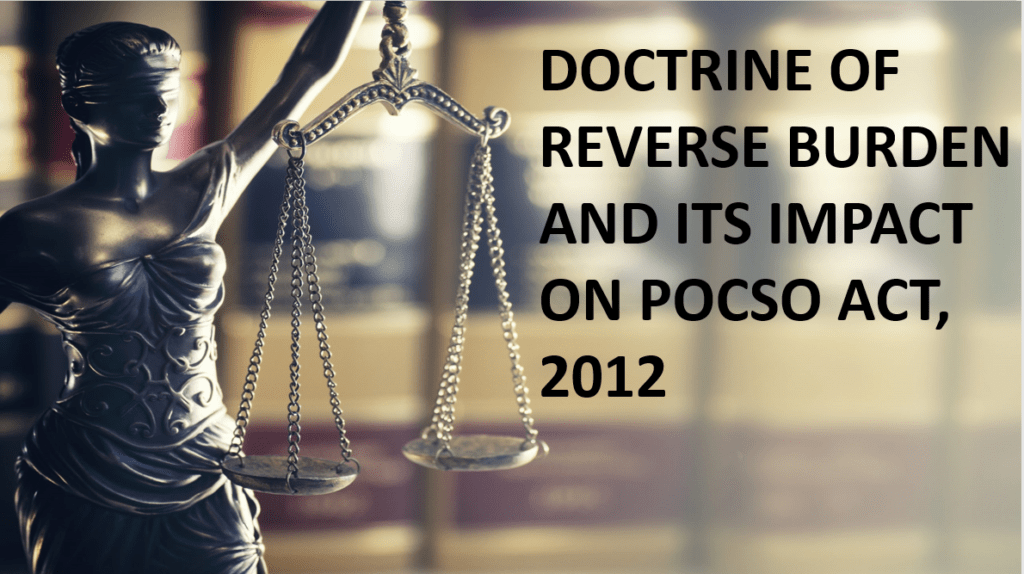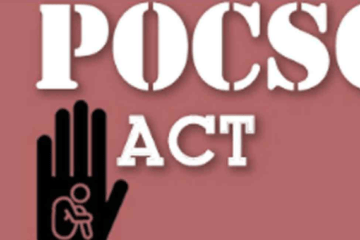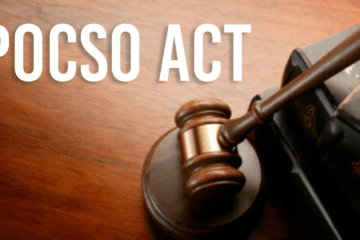
This article is written by Shyambhavi Singh of 7th semester of University Institute of Legal Studies, Panjab University, Chandigarh, an intern under Legal Vidhiya
ABSTRACT
This article revolves around the concept of doctrine of Reverse burden of proof and its relation to Protection of Children from Sexual offences Act, 2012(hereinafter referred as POCSO Act). The concept of reverse burden is quite opposite and uncommon in the criminal jurisprudence. The basic principle is of law is that the prosecution is burdened with the responsibility of showing the guilt of accused. The present article deals with the reverse burden in detail including its origin and historical development, advantages and criticism. It further includes the constitutionality status of the doctrine and relevant case laws to the same. The readers are advised to read the full article in order to get in depth knowledge of the topic.
KEYWORDS
Presumption of innocence, presumption of guilt, reverse burden, negative shift of burden, POCSO Act, section 29 of POCSO, section 30 of POCSO Act, unconstitutional, sexual offences, sexual assault, innocent until proven guilty.
INTRODUCTION
In criminal law, the fundamental principle of “presumption of innocence” is followed where the accused is presumed to be innocent until his guilt has been proven by the prosecution. It is the responsibility of the prosecution to prove the guilt of the accused beyond reasonable doubt. The Law of evidence provides the initial burden on the prosecution to prove against the accused his crime and guilt in the court of law. However, there are some laws which provide for the concept of ‘reverse burden’ which is opposite to the concept of presumption of innocence in favor of accused. It is also considered as a negative shift where there is a presumption of guilt imposed on the accused.
DOCTRINE OF REVERSE BURDEN
The legal concept of reverse burden is when the responsibility of proving the innocence of the act is on the accused in contradiction to the basic principle where the initial burden lies on the prosecution. In other words, it means that the burden or onus has been shifted to the defendant or accused in civil or criminal cases respectively. As a general rule, the basic principle is applied but, the law in certain circumstances provides for reverse onus on accused to prove his innocence in a particular case. Such types of cases include cases of strict liability or where the offence is so grave that the burden shifts on the accused to show his part of innocence in the particular cases.
ORIGIN AND DEVELOPMENT OF THE REVERSE BURDEN CONCEPT
It was the European Court of Human Rights that played a significant amount of role in the establishment and shaping of the doctrine of reverse onus. The recognition of this doctrine was never done by the European Courts of Human Rights although, they used it in certain areas and cases. The idea of the reverse onus can be seen from the times of ancient roman law. The defendant had the burden of proof to establish their case under roman law of proof, but once they had established their case exclusively, the burden of proof shifted from the defendant to the plaintiff side of party. Where the plaintiff has information that would be difficult or impossible to obtain, in modern law practices, the defendant has a reverse onus in such situations. In situations where the plaintiff’s rights are impossible to protect, the burden of proof again shift to the defendant.
Different legal systems have used the reverse onus in different ways. It is a rule of evidence that is not applicable in some jurisdictions; in others, it is applied in specific cases or in certain areas of law. The practice of relying on the reverse assumption is gaining traction, particularly when there is a compelling public demand that outweighs the importance of the innocence presumption. Although it can be a powerful tool for preventing wrongful convictions, it also needs to be considered by legislators, judges, and jurors alike. On the one hand, it can help to counteract the inherent power imbalances present in many criminal cases, ensuring that defendants are not unfairly punished for crimes they did not commit. On the other hand, it could also increase the likelihood of false allegations and unjust punishment, particularly in cases where evidence is scarce. The effectiveness of the reverse onus in achieving justice will ultimately depend on the context in which it is applied and the justice system as a whole. [1]
BENEFITS
Though the concept of reverse onus is criticized by many people but there are a few compelling and absolute reasons which makes it a significant doctrine in different types of cases. The prosecutors often face difficulties in proving the case beyond reasonable doubt against the accused, and sometimes which lead to delayed or no justice to the innocent party. Moreover, where the accused is an influential or powerful person, it gets difficult for the prosecution to prove his guilt as these persons by exercising their power and influence are able to evade justice and penalties. In such cases, the reverse burden doctrine helps the parties to win the cases.
CRITICISMS
The concept of reverse onus is considered as arguable and controversial as it is seen to be violating the principle of presumption of innocence where it is on the prosecution to prove the guilt of accused and not the accused to show his innocence. It is also considered to violate the basic concept of fair trial. The concept of fair trial is where the accused is given an adequate and reasonable opportunity to prove and defend himself. It is also considered as a fundamental right enshrined under Constitution and is a way to ensure justice. It is also argued that unfair onus or burden on accused can cause wrongful convictions.
REVERSE BURDEN IN POCSO ACT 2012
The Protection of children from sexual offences Act 2012 was established in the year 2012 with the aim to protect the children from evils and exploitation of offenders. The Act provides for the establishment of Special Courts to deal with the cases of the POCSO Act and punish the offenders as per the gravity of offenses committed by them. The Act defines and explains various kinds of offenses, penalties, and the procedure to be followed in such cases. Section 29 of the Act explains that where the offender is tried for committing, abetting or attempting the offence of sexual assault, penetrative sexual assault, aggravated penetrative sexual assault, or aggravated sexual assault , he shall be presumed by the Special Court to have committed, abetted or attempted such offence.
Under Section 30 of the Act, the Court shall presume the culpable mental state in any offence under this Act which requires a culpable mental state. Sections 29 and 30 of the POCSO Act provides for the reverse burden where the accused is presumed to be guilty by the Special Court under this code. By this, it is on the accused to prove his innocence in the case in which he has been prosecuted. As it puts the burden or responsibility of defense on the accused, it is known as ‘reverse burden’.
CONSTITUTIONALITY OF REVERSE BURDEN UNDER SECTION 29 & 30 OF POCSO ACT
Sections 29 and 30 of the POCSO Act provides for the doctrine of reverse burden where the guilt and culpable mental state of offenders is presumed by the Court. The Constitutional validity of Sections 29 & 30 of the POCSO Act was challenged in the case of Justin @Renjith v Union of India[2] where the accused was prosecuted under Sections 3,7 ,9 and 5 of POCSO Act. He challenged the sections 29 and 30 and contended these sections as unconstitutional and violative of Articles 14, 19, 20(3) and Article 21 guaranteed by the Constitution of India. It was also contended that such presumption and negative shift makes the accused defenseless and it may compel them to incriminate themselves by cross examination.
While dealing with the question of constitutionality, the Court also observed the case of Nikesh Tara Chand Shah v Union of India[3] where it was held by the Supreme Court that since the aim of POCSO Act was to fulfill the provisions mandated under the Article 15(3) of Constitution, hence challenging the provisions that it violates the Right to equality as given under Article 14 is unreasonable.
In the case of Noor Aga v. State of Punjab & Ors.[4] The court held that Article 20(3) is violated only when the accused is forced to testify against himself whereas in cross examination, he is only asked questions. Therefore, the provisions cannot be said to violate the Article 20(3) of the Constitution.
After due consideration to facts and all the related case laws, the Court concluded that the Sections 29 & 30 of the POCSO Act are not unconstitutional or illegal . The presumption under sections 29 & 30 of POCSO Act shall only arise when at the first place, the prosecution is able to establish the facts of the case that would lead to foundation for this presumption.
CASE LAWS
P Prathap Kumar Nayak v State(2023)[5]
In this case, an appeal was filed by P prathap on whom allegations were made by the victim’s mother that while accused wife was out with the neighbor, he sexually assaulted the victim which resulted in bleeding from her private area. It was contended by the accused that the allegations are false and no medical evidence support their statements.
The Court held that the hymen would have been torn if there would have been insertion and as per the medical certificate, the hymen was intact and no injuries on private parts of victim were reported. It was further observed by the Court that where medical evidence do not support the allegations, the presumption under Section 29 of POCSO Act, 2012 against accused would result in miscarriage of justice. Hence, the conviction was set aside of the accused by the Court.
Mariappan v Inspector of Police(2023)[6]
In this case, the accused was a fruit vendor who called the victim and his brother to his house. He gave them fruit juice mixed with alcohol and committed penetrative sexual assault. Next morning, the accused threatened the victim and gave some money to not disclose the act to anyone. The complaint was filed after a child was delivered by the victim resulting from the penetrative act. The accused was convicted by the Sessions Judge under the section of IPC and POCSO Act. It was observed that the victim was unable to prove the foundational facts that she was a minor and accused had committed penetrative sexual assault.
The Court held that in order to invoke the presumption under Section 29 of the POCSO Act , the prosecution must prove the foundational facts by preponderance of probability and not beyond reasonable doubt. In this case, as the prosecution was unable to prove the foundational facts, the said presumption cannot be invoked.
CONCLUSION
The doctrine of reverse burden is where it is on the accused to prove that he is not guilty for the act for which he is being tried for. This concept is contradictory and opposite to the fundamental principle of “innocent until proven guilty” where the initial burden is on the prosecution to prove his case beyond reasonable doubt. The doctrine of reverse onus is enshrined in the POCSO Act 2012 under Section 29 & 30. The Constitutional validity of the principle of reverse burden has been upheld by the court. There have been cases where it has been observed that it is important for the prosecution to first prove the foundational facts to invoke the presumption under Section 29 of the Act. Though the doctrine of reverse burden is controversial as it infringes the right to fair trial and negative shift of burden is on the accused but, it is beneficial too at times.
REFERENCES
- https://www.lawyersclubindia.com/judiciary/justin-ranjith-v-uoi-2020-constitutional-validity-of-reverse-burden-of-proof-under-pocso-act-4877.asp (Latest visited on 9th January 24)
- https://uollb.com/blog/law/reversed-burden-of-proof (Latest visited on 11th January 24)
- https://www.drishtiias.com/daily-news-analysis/section-29-of-the-pocso-act/print_manually (Latest visited on 12th January 24)
- https://crlreview.wordpress.com/2021/02/10/constitutionality-of-reverse-burden-under-pocso/ (Latest visited on 12th January 24)
- https://www.livelaw.in/amp/high-court/madras-high-court/madras-high-court-presumption-of-guilt-section-29-pocso-prosecution-prove-fundamental-facts-238421 (Latest visited on 12th January 24)
[1] Legalserviceindia https://www.legalserviceindia.com/legal/article-11588-reverse-onus-a-jurisprudential-analysis-and-charting-its-relevance-in-the-indian-diaspora.html (Latest visited on 11th January 24)
[2] Justin @Renjith v. Union of India (2020)WP © No. 15564 of 2017 (U)
[3] Nikesh Tarachand Shah v. Union of India, WP (Criminal) No. 67 of 2017
[4] Noor Aga v. State of Punjab & Others. SLP (Crl.) No. 5597 of 2006
[5] P Prathap Kumar Nayak v State (2023) LiveLaw (Mad) 330
[6] Mariappan v Inspector of Police 2023 LiveLaw (Mad) 275
Disclaimer: The materials provided herein are intended solely for informational purposes. Accessing or using the site or the materials does not establish an attorney-client relationship. The information presented on this site is not to be construed as legal or professional advice, and it should not be relied upon for such purposes or used as a substitute for advice from a licensed attorney in your state. Additionally, the viewpoint presented by the author is of a personal nature.




0 Comments